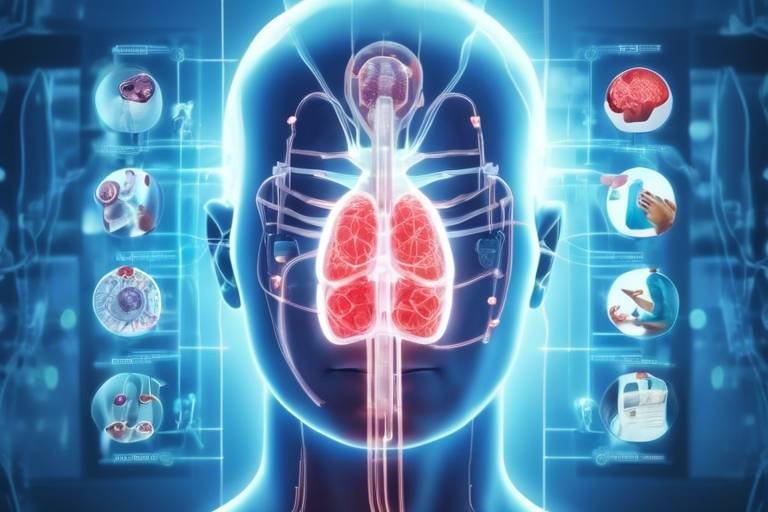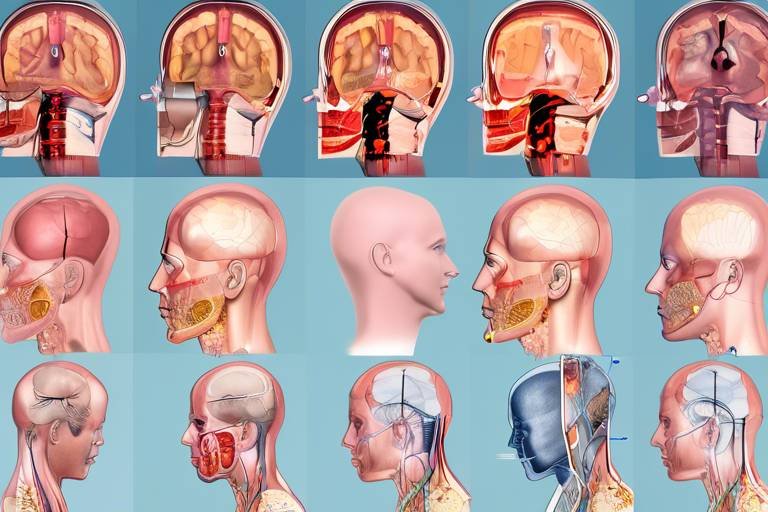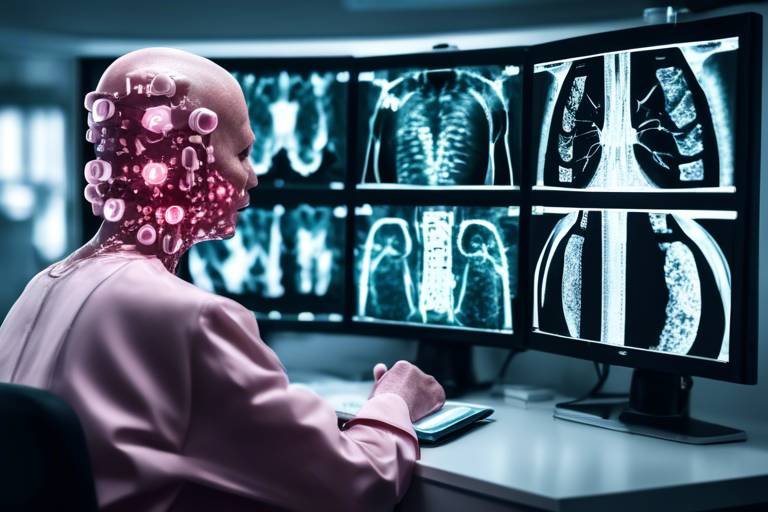AI: The New Frontiers in Healthcare
The advent of artificial intelligence (AI) in healthcare is nothing short of revolutionary. As technology continues to advance at an unprecedented pace, AI is reshaping how we approach patient care, diagnostics, and treatment methods. Imagine a world where diseases are detected before symptoms even appear, where treatments are tailored specifically to your genetic makeup, and where healthcare is accessible to everyone, regardless of their location. This is not just a dream; it's becoming a reality thanks to the transformative power of AI. The integration of AI into healthcare is enhancing not only patient outcomes but also operational efficiency across the board. In this article, we will explore the various dimensions of AI in healthcare, examining its applications, benefits, challenges, and future possibilities.
One of the most significant ways AI is making waves in healthcare is through diagnostics. Traditional diagnostic methods often rely on human interpretation, which can be prone to error. However, AI technologies are stepping in to enhance diagnostic accuracy by utilizing advanced algorithms to analyze medical images and patient data. For instance, AI systems can examine X-rays, MRIs, and CT scans with a level of precision that often surpasses human capabilities. By identifying patterns and anomalies that might go unnoticed, these systems lead to earlier detection of diseases such as cancer, heart disease, and more. This not only allows for timely intervention but also results in improved treatment plans that are tailored to the individual needs of patients.
The concept of personalized medicine is becoming more prevalent, and AI plays a crucial role in this evolution. By analyzing vast amounts of genetic information and patient history, AI enables healthcare providers to develop more effective therapies. Imagine a scenario where your treatment plan is customized specifically for you, based on your unique genetic profile and lifestyle factors. This level of personalization not only enhances the effectiveness of treatments but also fosters better patient engagement. Patients are more likely to adhere to their treatment plans when they understand that these plans are tailored specifically for them. The result? Improved health outcomes and a more proactive approach to managing one’s health.
Another fascinating application of AI in healthcare is through predictive analytics. This technology helps healthcare providers anticipate patient needs and optimize resource allocation. For example, AI can analyze historical data to predict which patients are at a higher risk for readmission after discharge. By identifying these individuals early, healthcare providers can implement proactive interventions, such as follow-up appointments or tailored care plans, to mitigate these risks. This not only improves patient care but also reduces hospital readmissions, which is a significant concern for healthcare systems worldwide.
The drug discovery process is notoriously lengthy and expensive. However, AI is accelerating this process by utilizing algorithms that can identify potential compounds and predict their effectiveness. This significantly reduces both the time and cost associated with bringing new medications to market. With AI, researchers can analyze vast datasets to find promising drug candidates much more quickly than traditional methods allow. This means that patients could potentially gain access to new treatments faster than ever before, transforming the landscape of modern medicine.
The rise of telemedicine has been further enhanced by AI technologies, providing real-time data analysis and improving patient monitoring. Imagine being able to consult with your doctor from the comfort of your home, while AI tools continuously monitor your health metrics. This integration is particularly beneficial for patients in underserved areas, where access to healthcare services may be limited. By facilitating remote consultations and enabling continuous monitoring, AI is breaking down barriers and expanding access to essential healthcare services.
Beyond direct patient care, AI applications are streamlining administrative tasks within healthcare organizations. By automating routine processes, managing patient flow, and optimizing supply chains, AI leads to increased operational efficiency and significant cost reductions. For example, AI can help predict patient volumes, allowing hospitals to allocate resources more effectively. This not only enhances the patient experience but also ensures that healthcare providers can deliver quality care without unnecessary delays or resource wastage.
As we embrace the benefits of AI in healthcare, it’s crucial to address the ethical considerations that arise. Questions about data privacy, algorithmic bias, and the transparency of AI decision-making processes are paramount. How do we ensure that AI systems treat all patients equitably? What measures are in place to protect sensitive patient data? These are important discussions that must take place as we move forward with AI integration in healthcare.
As AI technologies evolve, so too must the skills of healthcare professionals. Training programs are essential to ensure that staff can effectively collaborate with AI systems. This not only enhances patient care but also empowers healthcare workers to make informed decisions based on AI-generated insights. The future of healthcare will undoubtedly rely on a workforce that is well-versed in these technologies, ensuring that they can leverage AI tools to enhance patient outcomes.
Looking ahead, the potential of AI in healthcare continues to expand. Innovations promise to reshape patient experiences, improve outcomes, and create a more efficient healthcare ecosystem. As we stand on the brink of this new frontier, the question is not whether AI will change healthcare, but how quickly and effectively we can harness its power for the greater good.
- What is AI in healthcare? - AI in healthcare refers to the use of artificial intelligence technologies to improve patient care, diagnostics, treatment, and operational efficiency.
- How does AI improve diagnostics? - AI enhances diagnostics by analyzing medical images and patient data to identify patterns and anomalies, leading to earlier disease detection.
- What are the ethical concerns of AI in healthcare? - Ethical concerns include data privacy, algorithmic bias, and the transparency of AI decision-making processes.
- Will AI replace healthcare professionals? - AI is designed to augment the capabilities of healthcare professionals, not replace them. Training will be necessary for effective collaboration.

Revolutionizing Diagnostics
The world of healthcare is witnessing a seismic shift, and at the forefront of this transformation is artificial intelligence (AI). Imagine a world where diagnosing diseases is not only faster but also more accurate. AI technologies are making this vision a reality by analyzing medical images and patient data with an efficiency that surpasses traditional methods. For instance, AI algorithms can sift through thousands of X-rays or MRIs in a fraction of the time it takes a human radiologist, identifying anomalies that may go unnoticed. This capability leads to earlier detection of diseases, which is crucial for conditions like cancer, where timely intervention can significantly improve patient outcomes.
Moreover, the integration of AI in diagnostics is not limited to imaging. It extends to analyzing patient history and laboratory results, providing healthcare professionals with a comprehensive view of a patient’s health. By leveraging vast amounts of data, AI can offer insights that help in crafting tailored treatment plans. This personalized approach is akin to having a bespoke suit made just for you, as opposed to picking something off the rack. Each patient's unique genetic makeup and medical history are considered, ensuring that the treatment aligns perfectly with their needs.
However, the journey to revolutionizing diagnostics with AI is not without its challenges. The accuracy of AI systems heavily relies on the quality and quantity of data available for training. Inadequate or biased data can lead to erroneous conclusions, which could adversely affect patient care. Therefore, healthcare organizations must prioritize data governance and ethical considerations when implementing AI technologies.
In addition, collaboration between AI systems and healthcare professionals is essential. It’s not about replacing human expertise but rather augmenting it. The ideal scenario is one where AI acts as a powerful assistant, providing healthcare workers with data-driven insights that enhance their decision-making capabilities. This partnership can lead to a more accurate diagnosis and ultimately better patient outcomes.
To illustrate the impact of AI in diagnostics, consider the following table that highlights some key applications and their benefits:
| AI Application | Benefits |
|---|---|
| Medical Imaging | Improved accuracy in detecting tumors, fractures, and other abnormalities. |
| Predictive Analytics | Early identification of potential health risks based on patient data. |
| Genetic Analysis | Personalized treatment plans based on genetic predispositions. |
| Symptom Checkers | Guiding patients to appropriate care based on reported symptoms. |
As we move forward, the potential of AI in diagnostics is boundless. The continuous evolution of machine learning algorithms promises to make diagnostics not only more accurate but also more accessible. Imagine a future where patients in remote areas can receive expert diagnostic opinions through AI-driven platforms, breaking geographical barriers and ensuring that everyone has access to quality healthcare.
In conclusion, the revolution in diagnostics driven by AI is not just a trend; it is a fundamental shift that holds the promise of improving patient outcomes significantly. As we embrace these technologies, it is vital to ensure that we do so ethically and responsibly, always keeping the patient at the center of care.
- How does AI improve diagnostic accuracy? AI analyzes vast amounts of data quickly, identifying patterns that may be missed by human eyes.
- What are the challenges of using AI in diagnostics? Challenges include data quality, potential biases, and the need for collaboration between AI and healthcare professionals.
- Will AI replace doctors in diagnostics? No, AI is designed to assist healthcare professionals, enhancing their capabilities rather than replacing them.
- How can patients benefit from AI in diagnostics? Patients can expect quicker diagnoses, more personalized treatment plans, and improved health outcomes.

Personalized Medicine
In the realm of healthcare, the concept of is nothing short of revolutionary. Imagine a world where treatments are tailored specifically to your unique genetic makeup, lifestyle, and health history. This is not just a dream; it's becoming a reality thanks to the advancements in artificial intelligence (AI). By harnessing the power of AI, healthcare providers can analyze vast amounts of data, including genetic information, to create customized treatment plans that are more effective than traditional one-size-fits-all approaches.
At the heart of personalized medicine is the ability to understand how individuals respond differently to various treatments. For instance, two patients with the same diagnosis might react entirely differently to the same medication. This variability can be due to genetic differences, environmental factors, or even lifestyle choices. By utilizing AI algorithms, healthcare professionals can identify these differences and tailor therapies accordingly, ensuring that patients receive the most appropriate care. This not only enhances treatment efficacy but also minimizes the risk of adverse effects.
AI plays a crucial role in analyzing big data from multiple sources, including electronic health records, genomic databases, and clinical trials. This data-driven approach allows for the identification of patterns and correlations that would be impossible to discern through manual analysis. For example, AI can help in:
- Identifying Biomarkers: AI can sift through genetic data to identify biomarkers that predict how a patient will respond to a specific treatment.
- Optimizing Drug Dosages: By analyzing patient data, AI can recommend the optimal dosage for medications, reducing the trial-and-error approach often seen in traditional medicine.
- Enhancing Patient Engagement: Personalized treatment plans encourage patients to actively participate in their healthcare journey, leading to better adherence and outcomes.
Additionally, the integration of AI in personalized medicine has paved the way for significant advancements in the management of chronic diseases. Conditions such as diabetes, heart disease, and cancer can greatly benefit from tailored therapies that consider a patient's unique profile. For example, in cancer treatment, AI can analyze tumor genetics to determine the most effective chemotherapy drugs, leading to improved survival rates and reduced side effects.
However, while the benefits of personalized medicine are clear, there are also challenges that must be addressed. Issues related to data privacy, the need for robust clinical validation of AI algorithms, and ensuring equitable access to these advanced treatments are critical. As we embrace this new frontier, it is essential to navigate these challenges thoughtfully, ensuring that the promise of personalized medicine is realized for all patients.
In summary, the fusion of AI and personalized medicine is not just enhancing the way we treat diseases; it is fundamentally changing the patient experience. With the ability to tailor treatments to individual needs, we are moving toward a future where healthcare is not only more effective but also more compassionate and patient-centered.
- What is personalized medicine? Personalized medicine is a medical model that tailors healthcare treatments to the individual characteristics of each patient, often using genetic information.
- How does AI contribute to personalized medicine? AI analyzes large datasets to identify patterns and insights that help in creating customized treatment plans based on individual patient data.
- What are the benefits of personalized medicine? Benefits include improved treatment efficacy, reduced adverse effects, and enhanced patient engagement in their healthcare.
- What challenges does personalized medicine face? Challenges include data privacy concerns, the need for clinical validation of AI tools, and ensuring equitable access to personalized treatments.

Predictive Analytics in Healthcare
In the ever-evolving landscape of healthcare, predictive analytics has emerged as a game-changer, transforming the way healthcare providers understand and respond to patient needs. Imagine being able to foresee potential health issues before they escalate, much like a weather forecast that warns us of impending storms. This proactive approach not only enhances patient care but also optimizes resource management within healthcare facilities. By harnessing the power of big data and sophisticated algorithms, predictive analytics allows healthcare professionals to anticipate patient requirements, streamline operations, and improve overall outcomes.
One of the most significant advantages of predictive analytics is its ability to identify at-risk patients. For instance, by analyzing historical data, healthcare providers can pinpoint individuals who may be prone to chronic diseases such as diabetes or heart conditions. This early detection enables timely interventions, allowing patients to adopt healthier lifestyles or receive preventive care before serious complications arise. The following table illustrates how predictive analytics can aid in identifying risk factors for various conditions:
| Condition | Risk Factors | Predictive Analytics Role |
|---|---|---|
| Diabetes | Obesity, Family History, Sedentary Lifestyle | Identifies high-risk patients through data analysis |
| Heart Disease | High Blood Pressure, Smoking, High Cholesterol | Predicts likelihood based on lifestyle and medical history |
| Depression | Previous Mental Health Issues, Stressful Life Events | Analyzes patterns to flag potential mental health crises |
Moreover, predictive analytics plays a crucial role in hospital resource management. By analyzing patient admission patterns, healthcare facilities can better allocate staff, manage bed availability, and prepare for peak times. This not only enhances patient satisfaction by reducing wait times but also ensures that healthcare providers can deliver timely care without being overwhelmed. For example, during flu season, hospitals can anticipate a surge in patients and ramp up staffing and supplies in advance, ensuring a smoother operation.
Another fascinating application of predictive analytics is in reducing hospital readmissions. Studies have shown that a significant percentage of patients are readmitted shortly after discharge, often due to inadequate follow-up care or unmanaged health conditions. By leveraging predictive models, healthcare providers can identify patients who are at high risk of readmission and implement targeted follow-up strategies. This might include scheduling additional check-ups, providing educational resources, or even utilizing telehealth services for ongoing monitoring. The result? Lower readmission rates and improved patient outcomes.
In conclusion, the integration of predictive analytics in healthcare is not just a trend; it’s a vital component of modern medical practice. It empowers healthcare providers to make informed decisions, enhances patient engagement, and ultimately leads to better health outcomes. As we continue to embrace technology in healthcare, the potential for predictive analytics to reshape the landscape remains vast and exciting. Are we ready to harness this power for a healthier future?
- What is predictive analytics in healthcare?
Predictive analytics in healthcare involves using data analysis techniques to predict future patient outcomes and needs, enabling proactive care and resource management.
- How does predictive analytics improve patient care?
By identifying at-risk patients and anticipating their healthcare needs, predictive analytics allows for timely interventions and personalized treatment plans.
- Can predictive analytics reduce healthcare costs?
Yes, by optimizing resource allocation and reducing hospital readmissions, predictive analytics can lead to significant cost savings for healthcare organizations.

AI in Drug Discovery
Artificial Intelligence (AI) is revolutionizing the field of drug discovery, a process that traditionally has been lengthy, costly, and fraught with uncertainty. Imagine trying to find a needle in a haystack, where the needle represents a promising new drug candidate and the haystack is a vast expanse of chemical compounds. AI algorithms act as powerful magnets, helping researchers sift through massive datasets to identify potential drug candidates more efficiently than ever before. By leveraging machine learning and data analytics, AI can analyze complex biological data, predict how different compounds will behave in the human body, and even suggest modifications to enhance efficacy.
One of the most significant advantages of AI in drug discovery is its ability to shorten the time it takes to bring new medications to market. According to recent studies, the average time to develop a new drug can take over a decade, with costs often exceeding $2.6 billion. However, AI is changing the game by:
- Identifying potential drug candidates: AI algorithms can analyze chemical structures and biological data to pinpoint compounds that are most likely to succeed in clinical trials.
- Predicting drug interactions: By simulating how a drug will interact with various biological systems, AI can help researchers avoid potentially harmful side effects.
- Optimizing clinical trials: AI can enhance trial design by identifying the right patient populations and predicting outcomes, which leads to more efficient and successful trials.
Moreover, the integration of AI in drug discovery not only accelerates the process but also significantly reduces costs. A recent report indicated that AI could potentially save the pharmaceutical industry up to $50 billion annually by streamlining research and development processes. This is particularly crucial in an industry where financial resources are often limited and the stakes are incredibly high.
To illustrate the impact of AI in drug discovery, consider the following table showcasing notable successes:
| Drug | AI Technology Used | Outcome |
|---|---|---|
| DSP-1181 | Atomwise | First AI-designed drug to enter human trials in 2020 |
| Exscientia’s COVID-19 Drug | Exscientia | Developed a candidate in just 26 days |
| Insilico Medicine’s Drug | Generative Adversarial Networks (GANs) | Identified a lead candidate for fibrosis in just 18 months |
The future of AI in drug discovery looks incredibly promising. As technology continues to evolve, we can expect even more sophisticated algorithms that can analyze vast amounts of data at unprecedented speeds. This will not only enhance our understanding of diseases but also lead to the development of more targeted and effective therapies. In a world where personalized medicine is becoming the norm, AI stands at the forefront, ready to transform how we discover and develop new drugs that can improve patient outcomes.
- How does AI improve the drug discovery process?
AI improves drug discovery by analyzing large datasets to identify potential drug candidates, predict interactions, and optimize clinical trial designs. - What are the cost implications of using AI in drug discovery?
AI can significantly reduce the costs associated with drug discovery, potentially saving the pharmaceutical industry billions annually. - Are there any successful examples of AI in drug discovery?
Yes, drugs like DSP-1181 and candidates developed by Exscientia and Insilico Medicine are notable examples of AI's success in this field.

Telemedicine and AI Integration
In recent years, the convergence of telemedicine and artificial intelligence (AI) has revolutionized the way healthcare is delivered. Imagine being able to consult with a doctor from the comfort of your home, while an intelligent system analyzes your health data in real-time. This integration not only enhances patient experience but also significantly improves healthcare outcomes. By leveraging AI technologies, telemedicine platforms can provide a more personalized and efficient service, ensuring that patients receive the care they need when they need it.
One of the most exciting aspects of this integration is the ability of AI to process vast amounts of data quickly. For instance, AI can analyze patient histories, symptoms, and even genetic information to assist healthcare providers in making informed decisions during remote consultations. This means that a patient can receive tailored advice that considers their unique health profile, rather than a one-size-fits-all approach. Moreover, AI chatbots can handle initial inquiries, triaging patients based on urgency and directing them to the appropriate healthcare professionals.
The benefits of AI in telemedicine extend beyond just patient interactions. Healthcare providers can utilize AI to monitor patient conditions continuously. For example, wearable devices equipped with AI algorithms can track vital signs and alert doctors if any irregularities are detected. This proactive approach helps in identifying potential health issues before they escalate, ultimately leading to better patient management.
However, the integration of AI in telemedicine is not without challenges. There are concerns regarding data privacy and security, as sensitive health information is transmitted over the internet. It is crucial for healthcare organizations to implement robust security measures to protect patient data. Additionally, there is the issue of algorithmic bias, where AI systems might inadvertently favor certain demographics over others. To mitigate these risks, transparency in AI decision-making processes is essential, ensuring that all patients receive equitable care.
As telemedicine continues to evolve, the collaboration between healthcare professionals and AI systems will become increasingly vital. Training healthcare workers to effectively use these technologies will be key to maximizing their potential. By understanding how to interpret AI-generated insights and integrate them into their practice, healthcare providers can enhance their decision-making and ultimately improve patient outcomes.
In summary, the integration of AI in telemedicine is a game-changer. It not only enhances the accessibility of healthcare services but also improves the quality of care provided. As we move forward, the possibilities are endless, and the future of healthcare looks brighter than ever.
- What is telemedicine?
Telemedicine refers to the use of technology to provide healthcare services remotely, allowing patients to consult with healthcare providers without needing to visit a clinic or hospital.
- How does AI enhance telemedicine?
AI enhances telemedicine by analyzing patient data, providing real-time insights, and facilitating remote monitoring, which leads to better patient care and outcomes.
- Are there any risks associated with AI in telemedicine?
Yes, risks include data privacy concerns and potential algorithmic bias. It is important for healthcare organizations to address these issues to ensure safe and equitable care.
- What role do healthcare professionals play in AI integration?
Healthcare professionals must be trained to effectively use AI tools, interpret data, and integrate AI insights into their clinical decision-making processes.

Operational Efficiency and Cost Reduction
In the ever-evolving landscape of healthcare, operational efficiency and cost reduction have become paramount. With the integration of artificial intelligence (AI), healthcare organizations are experiencing a seismic shift in how they manage resources, streamline processes, and ultimately deliver care. Imagine a world where administrative burdens are lifted, allowing healthcare professionals to focus on what they do best—caring for patients. This vision is becoming a reality as AI technologies take center stage.
One of the most significant ways AI contributes to operational efficiency is through the automation of routine tasks. From scheduling appointments to managing patient records, AI systems can handle these processes with remarkable speed and accuracy. This not only reduces the workload on administrative staff but also minimizes the risk of human error. For instance, AI-driven scheduling algorithms can analyze patient availability and preferences, optimizing appointment slots and reducing no-shows. The result? A smoother workflow that enhances both patient and provider experiences.
Moreover, AI plays a crucial role in managing patient flow within healthcare facilities. By analyzing real-time data, AI can predict patient volumes and adjust staffing levels accordingly. This ensures that healthcare providers are neither overworked nor underutilized, striking a balance that enhances operational efficiency. In a recent study, facilities that implemented AI-driven patient flow management reported a 20% reduction in wait times and a corresponding increase in patient satisfaction. Such improvements not only elevate the patient experience but also lead to significant cost savings.
Another area where AI shines is in supply chain management. Healthcare organizations often grapple with the challenge of maintaining optimal inventory levels while minimizing waste. AI algorithms can analyze usage patterns, predict future demand, and automate reordering processes. This not only ensures that essential supplies are always on hand but also reduces the costs associated with overstocking or stockouts. To illustrate this point, consider the following table that outlines the potential savings from AI-driven supply chain optimization:
| Supply Chain Challenge | Traditional Approach Cost | AI-Optimized Cost | Potential Savings |
|---|---|---|---|
| Overstocking Inventory | $100,000 | $70,000 | $30,000 |
| Stockouts | $50,000 | $20,000 | $30,000 |
| Wasted Supplies | $30,000 | $10,000 | $20,000 |
| Total Savings | $180,000 | $100,000 | $80,000 |
As seen in the table, the shift to AI-optimized supply chain management can lead to substantial savings, freeing up funds that can be reinvested into patient care and other critical areas of the organization. By reducing unnecessary expenses, healthcare providers can allocate resources more effectively, ultimately enhancing the quality of care delivered to patients.
In addition to these operational improvements, AI also assists in the analysis of vast amounts of data generated within healthcare systems. By employing advanced analytics, AI can identify trends, inefficiencies, and areas for improvement that may not be immediately apparent to human analysts. This data-driven approach empowers healthcare organizations to make informed decisions that bolster operational efficiency and drive down costs.
However, it’s essential to acknowledge that while AI presents numerous opportunities for cost reduction and efficiency, it also requires careful implementation and ongoing evaluation. As organizations adopt these technologies, they must ensure that staff are adequately trained to work alongside AI systems, fostering a collaborative environment that maximizes the benefits of technology without compromising the human touch that is so vital in healthcare.
In conclusion, the integration of AI into healthcare operations is not merely a trend; it is a transformative movement that promises to redefine how healthcare is delivered. By embracing these technologies, organizations can achieve remarkable improvements in operational efficiency and cost reduction, ultimately leading to better patient outcomes and a more sustainable healthcare system.
- What are the primary benefits of AI in healthcare?
AI enhances diagnostic accuracy, personalizes treatment, optimizes resource allocation, and improves operational efficiency. - How does AI improve patient flow?
AI analyzes real-time data to predict patient volumes, helping to adjust staffing levels and reduce wait times. - Can AI reduce healthcare costs?
Yes, AI can streamline processes, optimize supply chains, and reduce administrative burdens, leading to significant cost savings. - What challenges come with implementing AI in healthcare?
Challenges include data privacy concerns, the need for transparency, and ensuring that healthcare professionals are trained to work with AI systems.

Ethical Considerations in AI Healthcare
As we dive deeper into the realm of artificial intelligence (AI) in healthcare, it becomes increasingly important to address the ethical considerations that accompany these advancements. The integration of AI technologies into healthcare systems is not just a matter of efficiency and innovation; it also raises significant questions about data privacy, algorithmic bias, and the overall transparency of AI decision-making processes. These issues are crucial to ensure that AI serves all patients equitably and effectively.
One of the foremost concerns is data privacy. With AI systems relying heavily on vast amounts of patient data to train algorithms, the potential for misuse or unauthorized access to sensitive information is a real threat. Patients must be assured that their personal health information is protected and used solely for the intended purpose of improving care. This calls for robust data governance frameworks that prioritize patient consent and data security.
Moreover, the issue of algorithmic bias cannot be overlooked. AI systems learn from historical data, which may contain biases that reflect societal inequalities. For instance, if an AI model is trained primarily on data from one demographic group, it may not perform well for patients from different backgrounds. This can lead to disparities in care and outcomes, perpetuating existing inequalities in the healthcare system. It's vital for developers and healthcare providers to actively work towards creating algorithms that are inclusive and representative of diverse populations.
Another critical aspect is ensuring transparency in AI decision-making. Healthcare professionals and patients alike need to understand how AI systems arrive at their conclusions. This is particularly important in high-stakes situations where treatment decisions are influenced by AI recommendations. Clear communication about the workings of AI algorithms can help build trust and encourage collaboration between AI systems and healthcare providers.
To address these ethical considerations, stakeholders in the healthcare sector must engage in ongoing discussions and develop comprehensive policies. This includes:
- Establishing clear guidelines for data usage and patient consent.
- Implementing rigorous testing to identify and mitigate biases in AI algorithms.
- Promoting transparency by educating healthcare professionals and patients about AI processes.
- Encouraging interdisciplinary collaboration between technologists, ethicists, and healthcare providers.
By proactively tackling these ethical dilemmas, the healthcare sector can harness the full potential of AI while ensuring that patient rights and equity remain at the forefront. The journey towards integrating AI in healthcare is not just about technological advancement; it's about creating a system that values and respects every individual it serves.
Q1: What are the main ethical concerns regarding AI in healthcare?
A1: The primary ethical concerns include data privacy, algorithmic bias, and the need for transparency in AI decision-making processes.
Q2: How can we ensure data privacy in AI healthcare applications?
A2: Robust data governance frameworks that prioritize patient consent and data security are essential to protect sensitive information.
Q3: What steps can be taken to mitigate algorithmic bias in AI?
A3: Developers should actively work towards creating inclusive algorithms by using diverse datasets and conducting rigorous testing to identify biases.
Q4: Why is transparency important in AI healthcare systems?
A4: Transparency helps build trust between patients, healthcare providers, and AI systems, ensuring that all parties understand how decisions are made.

AI Training and Workforce Development
The rapid integration of artificial intelligence into healthcare is not just about technology; it's also about the people who will use it. As AI systems become more sophisticated, the need for healthcare professionals to be well-versed in these technologies is paramount. Imagine a doctor who can not only diagnose a condition but also interpret AI-generated insights to provide the best possible care. This is the future we are heading towards, and it requires a significant shift in how we train our workforce.
First and foremost, training programs must evolve to include comprehensive education on AI tools and their applications in clinical settings. This means that medical schools and continuing education programs need to integrate AI into their curricula. By doing so, healthcare professionals can gain a foundational understanding of how AI works, its advantages, and its limitations. For instance, a recent study showed that healthcare providers who received training in AI technologies were able to make more informed decisions and improve patient outcomes significantly.
Moreover, it’s essential for healthcare organizations to foster a culture of continuous learning. This can be achieved through workshops, seminars, and online courses that focus on the practical applications of AI in healthcare. Mentorship programs can also play a crucial role, pairing experienced professionals with those new to AI, thereby facilitating knowledge transfer and enhancing collaboration. As healthcare becomes increasingly data-driven, professionals must learn to interpret complex datasets and use AI tools effectively to enhance patient care.
Another critical aspect of AI training is understanding the ethical implications of using these technologies. Healthcare professionals must be equipped to navigate issues such as data privacy, algorithmic bias, and the potential for AI to influence decision-making in ways that may not always be transparent. Training programs should include modules that address these ethical considerations, ensuring that healthcare providers are not only skilled in using AI but also aware of the responsibilities that come with it.
To illustrate the growing importance of AI training, consider the following table that outlines key training components necessary for effective AI integration in healthcare:
| Training Component | Description |
|---|---|
| AI Fundamentals | Understanding the basic concepts of AI, machine learning, and data analytics. |
| Practical Applications | Hands-on training with AI tools and software used in healthcare settings. |
| Ethics and Compliance | Education on ethical considerations, data privacy, and regulatory requirements. |
| Interdisciplinary Collaboration | Training on how to work effectively with data scientists and AI specialists. |
In conclusion, as we stand on the brink of a new era in healthcare, the importance of cannot be overstated. By investing in the education and training of healthcare professionals, we can ensure that they are not only competent in using AI technologies but also capable of leveraging these tools to enhance patient care. The future of healthcare is bright, but it will require a committed effort to prepare our workforce for the challenges and opportunities that lie ahead.
- What is the role of AI in healthcare training? AI plays a crucial role by providing tools and resources that enhance learning and decision-making for healthcare professionals.
- How can healthcare providers ensure they are trained in AI? By participating in workshops, online courses, and mentorship programs focused on AI technologies and their applications.
- What ethical issues should be addressed in AI training? Key ethical issues include data privacy, algorithmic bias, and the transparency of AI decision-making processes.
- Will AI replace healthcare professionals? No, AI is designed to assist healthcare professionals, enhancing their capabilities rather than replacing them.

The Future of AI in Healthcare
This article explores the transformative impact of artificial intelligence on healthcare, examining its applications, benefits, challenges, and future possibilities in improving patient outcomes and operational efficiency.
AI technologies are enhancing diagnostic accuracy by analyzing medical images and patient data, leading to earlier detection of diseases and improved treatment plans tailored to individual needs.
Artificial intelligence enables personalized treatment approaches by analyzing genetic information and patient history, allowing for more effective therapies and better patient engagement in managing their health.
Predictive analytics powered by AI helps healthcare providers anticipate patient needs, optimize resource allocation, and reduce hospital readmissions through data-driven insights and proactive interventions.
The drug discovery process is being accelerated by AI algorithms that identify potential compounds and predict their effectiveness, significantly reducing the time and cost associated with bringing new medications to market.
AI is enhancing telemedicine platforms by providing real-time data analysis, improving patient monitoring, and facilitating remote consultations, thereby expanding access to healthcare services, especially in underserved areas.
AI applications streamline administrative tasks, manage patient flow, and optimize supply chains, leading to increased operational efficiency and significant cost reductions for healthcare organizations.
The integration of AI in healthcare raises important ethical questions regarding data privacy, algorithmic bias, and the need for transparency in AI decision-making processes to ensure equitable patient care.
As AI technologies evolve, healthcare professionals must receive training to effectively collaborate with AI systems, ensuring they can leverage these tools to enhance patient care and decision-making.
Looking ahead, the potential of AI in healthcare continues to expand, with innovations promising to reshape patient experiences, improve outcomes, and create a more efficient healthcare ecosystem. Imagine a world where AI systems not only assist doctors in diagnosing ailments but also provide real-time updates on patient health, predict complications before they arise, and suggest personalized treatment options based on a patient’s unique genetic makeup. This is not just a dream; it’s becoming a reality as we see advancements in machine learning and natural language processing that are integrated into everyday healthcare practices.
Consider the possibilities for chronic disease management. AI can continuously monitor patient data through wearable devices, alerting healthcare providers to any significant changes that may require immediate attention. This proactive approach can lead to better management of conditions like diabetes or heart disease, ultimately improving patient quality of life. Furthermore, the integration of AI with telehealth services can make healthcare more accessible, especially for those living in remote areas. Patients can receive expert consultations without the need for extensive travel, breaking down barriers that have traditionally hindered access to quality care.
Moreover, AI is poised to revolutionize healthcare research. By analyzing vast amounts of data from clinical trials and patient records, AI can identify trends and correlations that may not be immediately visible to human researchers. This capability can accelerate the discovery of new treatments and refine existing ones, ensuring that patients receive the most effective therapies available.
However, as we step into this future, it’s crucial to address the challenges that come with it. Ensuring data privacy, mitigating algorithmic bias, and fostering trust in AI systems will be essential for widespread adoption. The healthcare industry must work collaboratively with technology developers, policymakers, and ethicists to create frameworks that protect patients while harnessing the power of AI.
In summary, the future of AI in healthcare is bright and full of potential. With ongoing innovation and a commitment to ethical practices, we can look forward to a healthcare landscape that not only enhances patient outcomes but also transforms the way we think about health and wellness.
- What is the role of AI in healthcare? AI helps improve diagnostics, personalize treatment, and streamline operations in healthcare settings.
- How does AI enhance patient care? By providing real-time data analysis, predictive insights, and personalized treatment plans, AI enhances patient engagement and outcomes.
- What are the ethical concerns related to AI in healthcare? Key concerns include data privacy, algorithmic bias, and the need for transparency in AI decision-making processes.
- Will AI replace healthcare professionals? No, AI is meant to assist healthcare professionals, not replace them. It enhances their capabilities and helps them provide better care.
- How can patients benefit from AI technologies? Patients can benefit from improved diagnostics, personalized medicine, and more accessible healthcare services through telemedicine.
Frequently Asked Questions
- What is the role of AI in revolutionizing diagnostics?
AI plays a pivotal role in revolutionizing diagnostics by analyzing medical images and patient data with impressive accuracy. This technology not only enhances the speed of diagnosis but also aids in the early detection of diseases, allowing healthcare providers to create tailored treatment plans that cater to individual patient needs.
- How does AI contribute to personalized medicine?
Artificial intelligence contributes to personalized medicine by examining genetic information and comprehensive patient histories. This analysis enables healthcare professionals to develop more effective therapies that resonate with each patient's unique biological makeup, resulting in better patient engagement and improved health outcomes.
- What are predictive analytics, and how are they utilized in healthcare?
Predictive analytics involve using AI to anticipate patient needs based on historical data and trends. Healthcare providers leverage these insights to optimize resource allocation, reduce hospital readmissions, and deliver proactive interventions, ultimately enhancing patient care and operational efficiency.
- How is AI transforming the drug discovery process?
AI is transforming the drug discovery process by utilizing algorithms that can identify potential compounds and predict their effectiveness. This significantly accelerates the development timeline and reduces costs, making it easier for pharmaceutical companies to bring new medications to market.
- In what ways does AI enhance telemedicine?
AI enhances telemedicine by providing real-time data analysis that improves patient monitoring and facilitates remote consultations. This integration expands access to healthcare services, particularly in underserved areas, ensuring that patients receive timely and effective care regardless of their location.
- What operational efficiencies can AI bring to healthcare organizations?
AI applications streamline various administrative tasks, manage patient flow, and optimize supply chains. By automating these processes, healthcare organizations can achieve increased operational efficiency and significant cost reductions, allowing them to focus more on patient care.
- What ethical considerations arise from the use of AI in healthcare?
The integration of AI in healthcare raises crucial ethical questions, particularly regarding data privacy, algorithmic bias, and transparency in AI decision-making. It's essential to address these issues to ensure that all patients receive equitable care and that their data is handled responsibly.
- How important is training for healthcare professionals in AI?
Training for healthcare professionals is vital as AI technologies evolve. By equipping them with the necessary skills to collaborate with AI systems, we can ensure that they effectively leverage these tools to enhance patient care and improve decision-making processes.
- What does the future hold for AI in healthcare?
The future of AI in healthcare is incredibly promising. With continuous innovations on the horizon, we can expect AI to reshape patient experiences, improve health outcomes, and create a more efficient healthcare ecosystem that benefits everyone involved.



















